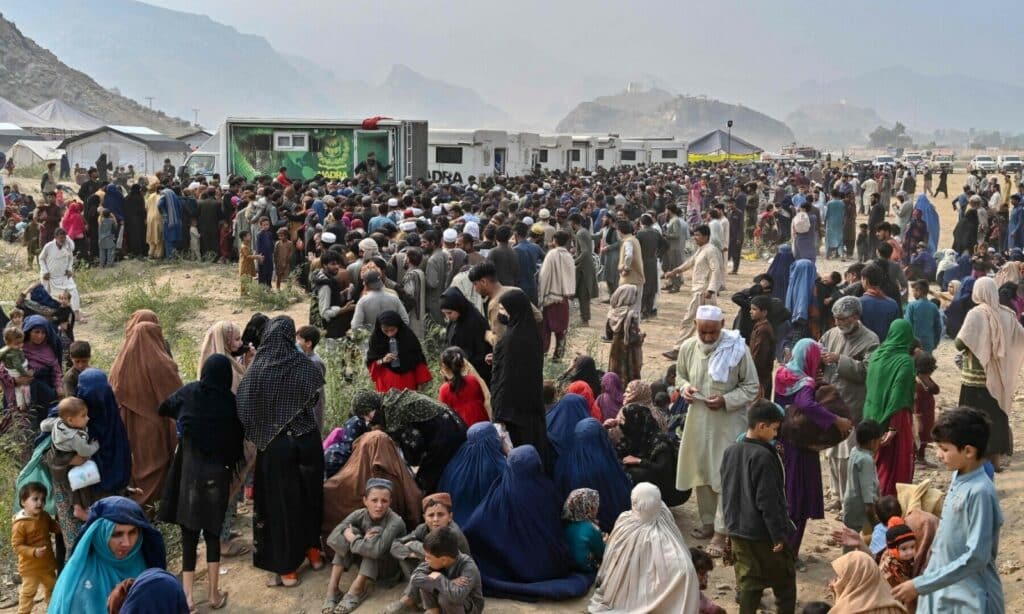Following the expiry of the government’s deadline for undocumented Afghan nationals, large-scale deportations continue across the country, with 1,636 more Afghans repatriated on Sunday from Punjab and Sindh.
According to the Home Department officials, Punjab saw the highest number of relocations, with 5,111 Afghan nationals transferred to transit camps and holding centres across the province. This group included 2,301 children and 1,120 women. Most of them held Afghan Citizen Cards (ACC), issued by NADRA after verification from FIA, police, and other authorities.
An official working on refugee affairs said security agencies had identified around 100,000 undocumented Afghans living illegally in over 150 “Afghan colonies” throughout the province. He explained that Afghan nationals are categorized into four groups. Among them are UNHCR-mandated refugees, who are legally protected under the Geneva Convention—signed by Pakistan—and are not subject to deportation.
Afghans holding valid legal documents are also not being deported at this stage. However, nearly 100,000 undocumented Afghans falling under the third and fourth categories—most of whom possess ACCs or no documents at all—are scheduled for repatriation. The Punjab government had earlier directed such individuals to leave the country by March 31.
Punjab’s Additional IG Police, Waqas Nazir, told the media that authorities initially identified over 150 Afghan colonies, including seven in Lahore. Residents were traced, informed of the government’s decisions, and subsequently relocated. He noted that enforcing these measures was a “grueling task” and that district police officers (DPOs) transferred 1,336 Afghans to 46 holding centres across the province on Sunday.
These individuals were later transported via designated buses to Landi Kotal, handed over to local authorities, and deported to Afghanistan on the same day. Nazir added that 5,111 additional Afghans were also relocated to camps and will be transferred to Khyber Pakhtunkhwa for further processing before repatriation. All deportees underwent medical screening prior to departure.
He emphasized that the government is adhering to its international commitments and obligations by providing care to undocumented foreigners prior to their repatriation.
Meanwhile, Punjab Inspector General of Police Dr. Usman Anwar chaired a high-level meeting to review the repatriation of undocumented Afghans. He stated that all deportees were provided with security and that transportation, logistics, and food arrangements were managed by the respective district administrations.
At the Hassan Abdal holding centre, many Afghans expressed dissatisfaction over the abrupt enforcement of deportation orders. They claimed to have suffered massive financial losses after hastily shutting down businesses and selling belongings at below-market prices.
Jhelum DPO Tariq Aziz said that Afghan detainees were being provided with bedding, food, and juices. Two buses carrying 157 Afghans departed from transit camps in Jhelum and Pind Dadan Khan after receiving essential supplies en route to the Torkham border.
In Rawalpindi, a police official confirmed that the crackdown against undocumented foreigners will continue. After verification at holding centres, those with valid ACCs and undocumented residents are being deported accordingly.
On Sunday, law enforcement authorities detained 736 Afghans, including 140 women and 164 children, and relocated them to the Afghan refugee camp near Golra Morh. Of these, 179 individuals were deported the same day.
Deportations from Sindh
In Sindh, Home Department officials reported that over 300 Afghans were deported from Karachi. Senior Minister Sharjeel Inam Memon stated that the deported group included 79 children, 37 women, and 191 men, all of whom were living in the country illegally.
DIG South Syed Asad Raza said that between April 1 and 6, a total of 409 Afghan Citizen Card holders were brought to Ameen House in Sultanabad from various parts of Karachi. Of these, 102 were released after verification at police stations, as they possessed valid Proof of Registration (PoR) cards.
A total of 307 Afghan card holders were eventually deported from Karachi to Afghanistan by bus on Saturday night under the supervision of law enforcement personnel.





